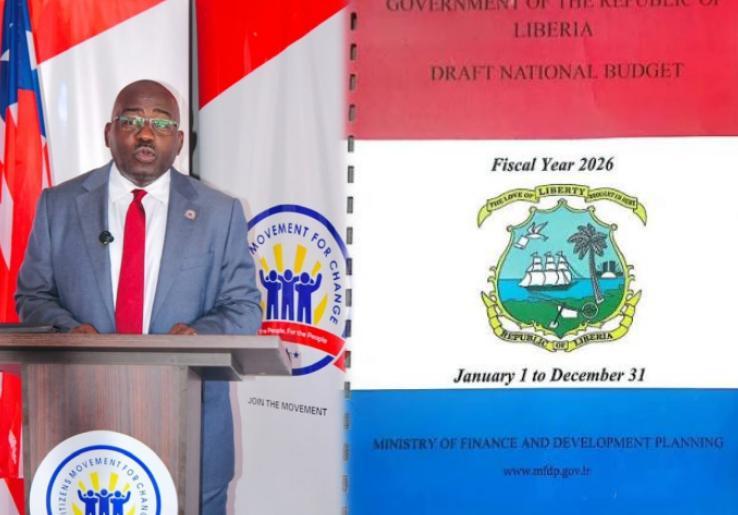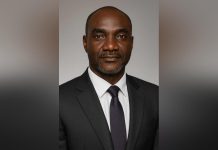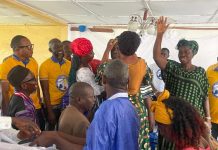Africa-Press – Liberia. Musa Hassan Bility, Political Leader of the Citizens Movement for Change (CMC) and Representative for District #7, Nimba County, has unveiled the party’s alternative “People’s Budget,” sharply criticizing President Joseph Boakai’s proposed 2026 National Budget as a spectacle built on lies and one-off windfalls.
In a national address from his party’s headquarters, Bility described the government’s plan as an “eating show” budget, designed for political theater rather than genuine development.
“The projection of 10 million dollars in contingency revenue from the Asset recovery task force has been positioned as a means to bolster the national budget, pushing it beyond the one-billion-dollar mark,” Rep. Bility said. “This maneuver is a clear illustration of the shameless inflation of the national budget which we view as an “eating show” budget, where speculative or unrealistic revenue streams are used to increase government spending.”
The Unity Party-led administration recently submitted to the Legislature, the draft 2026 National Budget totaling US$1.211 billion—the largest ever projected in Liberia’s history.
Administration officials view this milestone as an indicator of whether the government’s ambitious goal of generating $8.3 billion over five years under the ARREST Agenda can be achieved.
‘Unsustainable and Unrealistic Projections’
The Liberia Revenue Authority (LRA), led by Commissioner General Dorbor Jallah, has been tasked with raising this money, projecting an annual revenue need of $1.6 billion. Despite the proposed budget falling below that annual target, officials remain optimistic.
However, Representative Bility labeled the $1.2 billion projection “unrealistic,” arguing the appropriations fail to prioritize key sectors of the Liberian economy.
A core concern is the budget’s sustainability: nearly $200 million—or 17%—of the projected revenue relies on a one-time payment from ArcelorMittal in 2026.
“Can a nation be built on a single windfall, mortgaged on the hopes of corporate generosity? We think not,” Bility stated. He warned that projections for fiscal years 2027 and 2028 show a drastic reduction in revenues once such windfalls dry up, questioning who would bear the burden next.
Bility also denounced the Asset Recovery Task Force projection of $10 million as unrealistic, claiming it was used to inflate the national budget and divert attention from the country’s core development needs.
Imbalance in Allocations
Highlighting the imbalance in funding, Bility noted that while basic services remain underfunded, the legislative budget has risen 25% from $41 million to nearly $52 million.
Furthermore, bureaucratic compensation consumes over 27% of the total budget, increasing from $315 million to over $329 million. Yet, agriculture—a sector that employs over 60% of Liberians and has the highest potential for food security and sustainable revenue—receives barely 1% of the national budget, less than $14 million, and less funding than the office of presidential advisers.
“One percent for farmers and 27 percent for bureaucracy,” he stressed.
He added that 17 out of 18 state-owned enterprises failed to submit financial plans, which he called a clear violation of the Public Financial Management law, leading to a lack of transparency and increasing fiscal risks.
“Fellow Liberians, the 2026 figures do not represent responsible budgeting and prudent fiscal management. This is betrayal disguised as policy,” he declared. “The government calls this fiscal expansion growth. But we in the CMC call it what it is—reckless indulgence.”
The CMC’s Alternative ‘People’s Budget’
In contrast, Bility said the CMC’s People’s Budget aims to prioritize ordinary Liberians, focusing on education, agriculture, healthcare, infrastructure, and Micro, Small, and Medium Enterprises (MSMEs).
Key proposals in the CMC plan include increasing education funding by up to 20% to ensure access to quality schooling, raising agriculture allocations from $13.6 million to $120 million to support farmers.
On healthcare, he pledged that a CMC government will boost expenditure by $50 million to modernize hospitals and provide free primary care, expand spending on infrastructures from $133 million to $220 million to improve rural roads.
For MSMEs, the CMC will double support to foster private sector growth.
He noted the CMC plans to fund these initiatives by cutting fraud, waste, and abuse, digitizing government expenditure, improving tax administration, and enforcing greater compliance from corporations and the real estate sectors.
“Liberia deserves better—better than eating shows; better than budgets of lies,” Bility concluded. “The CMC stands for transformation, not tinkering. We are here to replace, not patch up.”
Representative Bility, once the Chairman of the Liberty Party, formed the CMC following disagreements with key party figures. Though not yet officially selected, he is widely touted as the CMC’s standard-bearer for the next presidential elections in 2029.
For More News And Analysis About Liberia Follow Africa-Press






